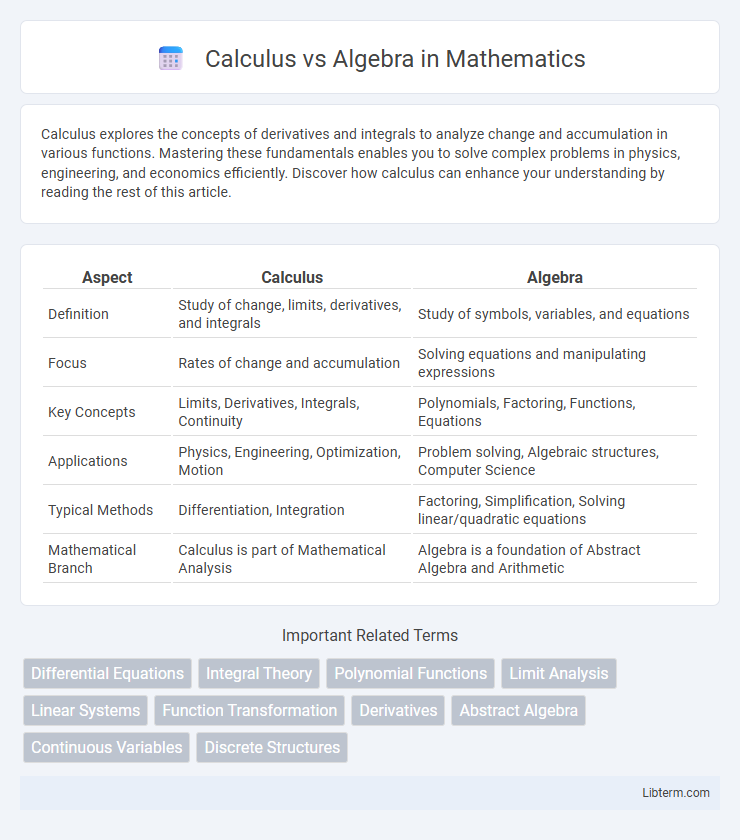Calculus explores the concepts of derivatives and integrals to analyze change and accumulation in various functions. Mastering these fundamentals enables you to solve complex problems in physics, engineering, and economics efficiently. Discover how calculus can enhance your understanding by reading the rest of this article.
Table of Comparison
| Aspect | Calculus | Algebra |
|---|---|---|
| Definition | Study of change, limits, derivatives, and integrals | Study of symbols, variables, and equations |
| Focus | Rates of change and accumulation | Solving equations and manipulating expressions |
| Key Concepts | Limits, Derivatives, Integrals, Continuity | Polynomials, Factoring, Functions, Equations |
| Applications | Physics, Engineering, Optimization, Motion | Problem solving, Algebraic structures, Computer Science |
| Typical Methods | Differentiation, Integration | Factoring, Simplification, Solving linear/quadratic equations |
| Mathematical Branch | Calculus is part of Mathematical Analysis | Algebra is a foundation of Abstract Algebra and Arithmetic |
Introduction to Calculus and Algebra
Calculus explores the study of change through derivatives and integrals, providing tools to analyze dynamic systems and continuous functions. Algebra focuses on understanding mathematical symbols and rules for manipulating equations and expressions, establishing the foundation for problem-solving and abstract reasoning. Together, these branches form essential components of mathematics, with algebra serving as a prerequisite for grasping calculus concepts.
Core Concepts: Calculus vs Algebra
Calculus centers on concepts such as limits, derivatives, integrals, and the study of change and motion, enabling the analysis of dynamic systems and continuous functions. Algebra focuses on manipulating symbols, solving equations, and understanding structures like groups, rings, and fields to address relationships between variables. While algebra provides foundational tools for abstract reasoning and equation solving, calculus extends these principles to handle variable rates and accumulation processes in real-world applications.
Historical Development of Calculus and Algebra
Algebra traces its origins to ancient civilizations such as Babylonia around 2000 BCE, evolving significantly through Islamic mathematicians like Al-Khwarizmi in the 9th century, who formalized methods for solving equations. Calculus emerged in the 17th century, primarily developed independently by Isaac Newton and Gottfried Wilhelm Leibniz, revolutionizing mathematical analysis with concepts of limits, derivatives, and integrals. The historical development of calculus was deeply influenced by earlier algebraic techniques, enabling the formulation of problems involving continuous change and motion.
Key Differences Between Calculus and Algebra
Calculus focuses on the study of change and motion through concepts like derivatives and integrals, while algebra centers on solving equations and manipulating symbols to find unknown values. Calculus often requires a strong understanding of functions and limits, enabling analysis of continuous variables, whereas algebra deals primarily with discrete variables and equations. Key differences include calculus's emphasis on infinitesimal changes and rates, contrasted with algebra's emphasis on equality and relationships among constants and variables.
Practical Applications in Real Life
Calculus plays a crucial role in physics, engineering, and economics by analyzing change and motion through derivatives and integrals, enabling optimization and modeling of dynamic systems. Algebra is fundamental in everyday problem-solving, including budgeting, architecture, and computer science, where it provides methods for manipulating equations and understanding relationships between variables. Together, these mathematical fields support critical functions such as data analysis, programming algorithms, and scientific research that drive technological advances and decision-making.
Essential Skills Required for Each Subject
Calculus requires a strong foundation in limits, derivatives, integrals, and understanding of continuous functions, emphasizing skills in problem-solving, analytical thinking, and the ability to work with complex mathematical models. Algebra demands proficiency in manipulating equations, understanding variables, expressions, and functions, along with skills in logical reasoning and recognizing patterns within mathematical structures. Mastery of algebraic techniques forms the essential groundwork for progressing into calculus concepts.
Difficulty Levels: Which Is Harder?
Calculus often presents greater difficulty due to its abstract concepts like limits, derivatives, and integrals that require strong analytical thinking and understanding of continuous change. Algebra focuses on manipulating symbols and solving equations, which can be more straightforward but becomes complex in advanced topics such as polynomial and quadratic equations. Mastery in calculus demands solid algebra skills, making calculus generally harder for students without a strong algebra foundation.
Calculus vs Algebra in Academic Curriculums
Calculus and algebra serve distinct yet complementary roles in academic curriculums, with algebra forming the foundational framework for mathematical understanding and problem-solving, while calculus introduces advanced concepts of change and motion essential for disciplines such as physics, engineering, and economics. Algebra curricula emphasize equations, functions, and inequalities, cultivating critical thinking and analytical skills through symbolic manipulation and patterns, whereas calculus courses focus on limits, derivatives, and integrals to model dynamic systems and continuous change. The progression from algebra to calculus reflects a structured academic pathway, ensuring students acquire the necessary conceptual tools to tackle higher-level quantitative challenges in STEM education.
Career Paths Influenced by Calculus and Algebra
Calculus plays a crucial role in career paths such as engineering, physics, computer science, and economics, where mathematical modeling and change analysis are essential. Algebra forms the foundation for careers in data analysis, cryptography, accounting, and software development, emphasizing problem-solving and equation manipulation. Mastery of calculus opens doors to advanced scientific research and technical innovation, while algebra proficiency supports diverse roles requiring logical reasoning and quantitative skills.
Choosing the Right Path: Calculus or Algebra?
Selecting between calculus and algebra depends on your academic goals and career aspirations; algebra forms the foundation of mathematical problem-solving used in various fields such as engineering and computer science, while calculus is essential for understanding continuous change in physics, economics, and advanced engineering. Algebra emphasizes solving equations and manipulating expressions, making it crucial for beginners, whereas calculus involves limits, derivatives, and integrals, tailored for those pursuing science, technology, engineering, and mathematics (STEM) disciplines. Assessing your interest in abstract mathematical theories versus practical applications can guide your choice between mastering algebra or advancing into calculus.
Calculus Infographic

 libterm.com
libterm.com